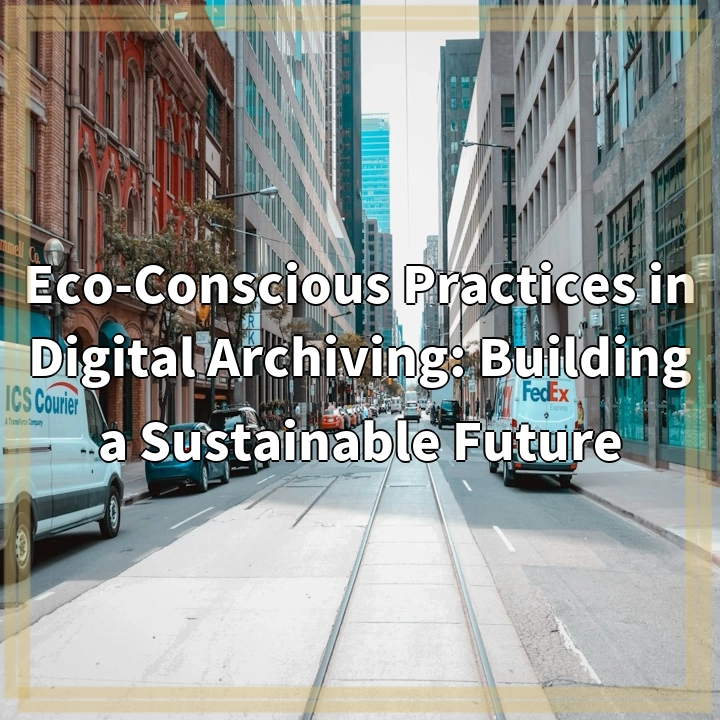
What is Eco-Conscious Practices in Digital Archiving?
Eco-conscious practices in digital archiving refer to the implementation of sustainable strategies and technologies to minimize the environmental impact of preserving and storing digital data. It involves adopting environmentally-friendly practices throughout the entire digital archiving process, from data creation and storage to long-term preservation.
Real-World Problems Associated with Eco-Conscious Practices in Digital Archiving
1. Energy Consumption:
The digital archiving process consumes a significant amount of energy, mainly due to the continuous power required to store and maintain large amounts of data. This energy consumption contributes to greenhouse gas emissions and increases the carbon footprint of digital archives.
2. E-Waste:
The rapid advancement of technology leads to a continuous cycle of hardware upgrades and replacements in digital archiving systems. This results in the generation of electronic waste, both from the discarded equipment and the components used to store data. Improper disposal of e-waste can have harmful effects on the environment.
3. Data Security:
Ensuring data security is vital in digital archiving. However, the use of security measures such as redundant data storage and backup systems can lead to increased energy consumption and storage requirements. Balancing data security while minimizing environmental impact is a challenge faced by eco-conscious digital archivists.
4. Preservation and Longevity:
Digital data requires proper preservation and long-term storage to ensure its accessibility and authenticity. However, digital formats and storage media can become obsolete over time, posing challenges in maintaining data integrity and preventing loss due to outdated technologies.
5. Infrastructure Limitations:
Building and maintaining the necessary infrastructure for digital archiving can be expensive and resource-intensive. Limited resources and technological infrastructure in certain regions or organizations may hinder the implementation of eco-conscious practices, making it a challenge to achieve sustainable digital archiving on a global scale.
Conclusion
Addressing the real-world problems associated with eco-conscious practices in digital archiving requires a multidisciplinary approach. It involves investing in energy-efficient technologies, promoting circular economy principles to reduce e-waste, developing sustainable data storage solutions, and raising awareness among archivists and stakeholders about the environmental impact of digital archiving. By implementing eco-conscious practices, we can build a sustainable future for digital archiving and mitigate its environmental footprint.

Solutions for Eco-Conscious Practices in Digital Archiving
1. Energy Efficiency:
Implementing energy-efficient technologies and practices can significantly reduce the energy consumption of digital archiving. This includes using energy-efficient servers and storage systems, optimizing data center cooling, and adopting power management strategies to minimize unnecessary energy usage.
2. E-Waste Management:
Implementing proper e-waste management strategies is crucial. This involves recycling and disposing of electronic equipment responsibly, ensuring that hazardous materials are handled safely, and exploring ways to extend the lifespan of hardware to reduce the generation of e-waste.
3. Sustainable Data Storage:
Exploring sustainable data storage options can contribute to eco-conscious digital archiving. This includes utilizing cloud storage services that utilize energy-efficient infrastructure, adopting data deduplication techniques to minimize storage needs, and implementing tiered storage strategies to optimize resource usage.
4. Long-Term Data Preservation:
To address challenges surrounding data preservation and longevity, adopting open and standardized file formats can help ensure long-term accessibility. Additionally, employing digital preservation strategies such as data migration and emulation can help mitigate risks associated with technological obsolescence.
5. Collaboration and Knowledge Sharing:
Fostering collaboration among archivists, researchers, and technology developers is crucial for finding innovative solutions and best practices for eco-conscious digital archiving. Sharing knowledge, experiences, and success stories can help advance sustainability efforts and guide future implementations.
Conclusion
By implementing these solutions, eco-conscious practices can be effectively integrated into digital archiving processes. With a focus on energy efficiency, e-waste management, sustainable data storage, long-term preservation, and collaboration, a more sustainable future can be built for digital archiving, ensuring the preservation of our cultural and historical heritage while minimizing environmental impact.















